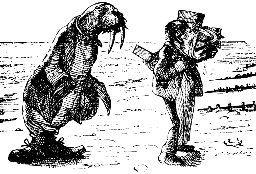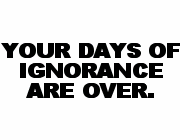
Carroll portrays the animals in Alice in Wonderland able to talk with Alice. It is only this way Alice is able to see them in a new light. She apologizes to the mouse thinking "she had hurt the poor animal's feelings." (26) The mouse was presented with emotions, a life story, and fears like herself. Most will see a mouse as vermin and filthy. It is seen as very negative and people today will certainly not think of it having feelings. Through this image of a mouse, like a human, Alice sees it differently. It's an example for readers to see animals with feelings and question their ethics.
 Same goes for the walrus and the carpenter eating the oysters. Alice had to "choose between judging a person in terms of acts or in terms of intentions." (188) It was hard for her to decide who was right and wrong because she was looking at "what the characters say than who the characters are." (Daniel) Alice was focusing on the carpenter and the walrus because their voice was stronger than the oysters'. She didn't manage to realize the carpenter and walrus were cruel characters in the way they ate the oysters. Carroll believed that "death is not cruel, but it is the prolonged and superfluous torturing." (unknown author)
Same goes for the walrus and the carpenter eating the oysters. Alice had to "choose between judging a person in terms of acts or in terms of intentions." (188) It was hard for her to decide who was right and wrong because she was looking at "what the characters say than who the characters are." (Daniel) Alice was focusing on the carpenter and the walrus because their voice was stronger than the oysters'. She didn't manage to realize the carpenter and walrus were cruel characters in the way they ate the oysters. Carroll believed that "death is not cruel, but it is the prolonged and superfluous torturing." (unknown author)Alice is seen as being unable to empathize with the oysters, so she can not understand the ethical dilemma of the poem. She shows a revelation for all humankind though. If one can't empathize with an animal, who in society's view is 'not as advanced and has no emotions,' how will one empathize with a human being? It takes true understanding to imagine how an animal will feel when it's environment is being destroyed, if it's mother has been taken away for slaughter, if all it ever will know is a tight cramped cag e. I understand why people will choose to live as a vegetarian or vegan. I also understand if some people can not meat because of a religious view. However, I do agree with Carroll on being a line drawn. Carroll makes a "clear distinction between animal suffering and animal death." (unknown author) The way an animal dies can be cruel, and that is what makes the matter unethical. If an animal dies quick and painless, it is not unethical. An animal should only be killed quick and painless for food. Torturing for entertainment, or "in the name of science" is immoral.
e. I understand why people will choose to live as a vegetarian or vegan. I also understand if some people can not meat because of a religious view. However, I do agree with Carroll on being a line drawn. Carroll makes a "clear distinction between animal suffering and animal death." (unknown author) The way an animal dies can be cruel, and that is what makes the matter unethical. If an animal dies quick and painless, it is not unethical. An animal should only be killed quick and painless for food. Torturing for entertainment, or "in the name of science" is immoral.
 e. I understand why people will choose to live as a vegetarian or vegan. I also understand if some people can not meat because of a religious view. However, I do agree with Carroll on being a line drawn. Carroll makes a "clear distinction between animal suffering and animal death." (unknown author) The way an animal dies can be cruel, and that is what makes the matter unethical. If an animal dies quick and painless, it is not unethical. An animal should only be killed quick and painless for food. Torturing for entertainment, or "in the name of science" is immoral.
e. I understand why people will choose to live as a vegetarian or vegan. I also understand if some people can not meat because of a religious view. However, I do agree with Carroll on being a line drawn. Carroll makes a "clear distinction between animal suffering and animal death." (unknown author) The way an animal dies can be cruel, and that is what makes the matter unethical. If an animal dies quick and painless, it is not unethical. An animal should only be killed quick and painless for food. Torturing for entertainment, or "in the name of science" is immoral.
No comments:
Post a Comment